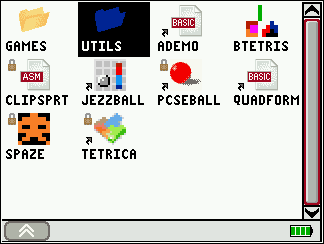- Doors CSE 8.1.2 Brings Bugfixes, Compatibility
- 04 Dec 2014 08:50:02 pm
- Last edited by KermMartian on 10 Dec 2014 02:47:57 pm; edited 1 time in total
Doors CSE 8 is the first and currently only assembly shell for the TI-84 Plus C Silver Edition, TI's flagship color z80 calculator. Built on the Doors CS 7 codebase, it lets you run any kind of TI-BASIC or assembly program, run and edit archived programs, use extra functions in TI-BASIC programs, and offers myriad additional features to make the TI-84+CSE more powerful. The most recent big update to Doors CSE was Doors CSE 8.1 in July: it brought new Hybrid BASIC functions, the ability to list and run Applications, and many bugfixes. Doors CSE 8.1.1 was subsequently released in August, and now Doors CSE 8.1.2 is available. These new updates bring the following fixes:
Download
 Doors CSE 8.1.2
Doors CSE 8.1.2

- Doors CSE 8.1.1: The InsertLine Celtic 2 CSE function no longer has the potential to insert invalid data when used on or past the last line of a file.
- Doors CSE 8.1.2: The ColorPixel ASM routine now reads the color for the drawn pixel correctly. In addition, in a major boon to TI-BASIC math programmers, all real() calls in normal TI-BASIC programs will correctly return the real part of the argument, regardless of the value entered. Previously, certain small positive integer values were incorrectly interpreted as Hybrid BASIC function calls. This change ensures that Doors CSE will not interfere with any normal non-Hybrid TI-BASIC program, including those that work with complex numbers.
Download














